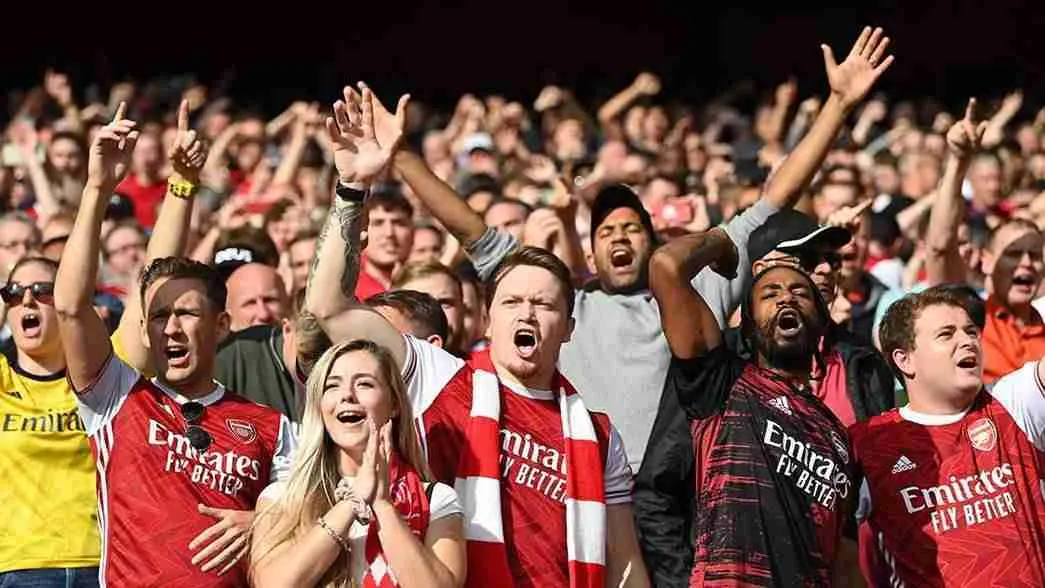Arsenal Football Club, with its storied history and loyal following, is more than just a team competing in the Premier League; it’s a community of passionate supporters whose voices resonate within the corridors of power at the club. Over the years, the influence of Arsenal’s fanbase has significantly shaped club decisions, strategies, and, ultimately, its success on the pitch. This article explores the multifaceted relationship between the club and its supporters, illustrating how the collective sentiments of fans can steer the direction of Arsenal and contribute to its legacy.
The Power of the Arsenal Fanbase
Arsenal has one of the largest and most passionate fanbases in the world. From the iconic Highbury to the modern Emirates Stadium, the support for the Gunners has never waned. With millions of fans globally, their influence extends beyond match days and social media; it plays a pivotal role in shaping the club’s identity and decisions.
The Evolution of Fan Influence
Historically, fan influence in football has evolved. In the past, clubs were often run with little regard for supporter input. However, as the game has grown commercially, the importance of the fanbase has become increasingly recognized. The rise of social media has amplified fan voices, making it easier for supporters to express their opinions and engage in discussions about club matters.
Arsenal’s fanbase has shown a remarkable ability to mobilize around issues, demonstrating their power through protests, campaigns, and calls for change. Whether it’s advocating for the return of a beloved player, demanding managerial changes, or protesting against ownership, Arsenal fans have consistently made their voices heard. The collective action of fans can lead to real changes in club policies and decisions.
Fan Impact on Club Decisions
1. Ownership and Management
One of the most significant aspects of fan influence at Arsenal revolves around the club’s ownership. The relationship between fans and American billionaire Stan Kroenke, who took full control of Arsenal in 2018, has been fraught with tension. Many supporters have expressed their dissatisfaction with Kroenke’s stewardship, arguing that he prioritizes profit over the club’s success.
In 2011, the Arsenal Supporters’ Trust (AST) played a crucial role in raising awareness about ownership issues, leading to protests against Kroenke’s involvement. Fans organized marches and campaigns that drew media attention, amplifying their concerns. While Kroenke has remained largely unyielding, the fan mobilization has forced the club to engage with supporters more openly, leading to the establishment of initiatives like the Arsenal Fans’ Forum.
2. Managerial Changes
The hiring and firing of managers is another area where fan influence is palpable. During the latter years of Arsène Wenger’s tenure, the fanbase became increasingly divided over his leadership. Calls for change grew louder as results began to decline, culminating in protests and banners expressing dissatisfaction with the club’s trajectory.
In 2018, the club appointed Unai Emery as Wenger’s successor. However, the results were mixed, and as fan discontent grew once again, the decision-makers at Arsenal found themselves under pressure. The poor performances and growing unrest among supporters led to Emery’s dismissal in December 2019. The appointment of Mikel Arteta in his place was partly influenced by fan sentiments and the desire for a return to a more traditional Arsenal playing style.
Arteta’s initial success endeared him to the supporters, but as results fluctuated, fans remained vocal about their expectations. The subsequent club decisions regarding player acquisitions and tactics have shown that the management is mindful of fan sentiment, as they seek to create a more competitive team that aligns with the aspirations of the fanbase.
3. Player Transfers
The transfer market is another area where fan influence can be seen. Arsenal’s fanbase is known for its passion regarding player recruitment, often discussing potential signings and expressing preferences through social media and fan forums. The pressure from supporters can lead to significant changes in the club’s transfer strategy.
For instance, the backlash following the departure of key players like Alexis Sánchez and Aaron Ramsey highlighted the importance of retaining star talents. Fans rallied for signings that would restore the team’s competitive edge, leading to high-profile acquisitions like Nicolas Pépé and Thomas Partey. While financial constraints can limit a club’s ability to operate in the transfer market, the influence of fans on the overall strategy is undeniable. The desire for marquee signings and top-quality players continues to shape Arsenal’s approach to transfers.
4. Club Culture and Identity
Beyond specific decisions, the Arsenal fanbase plays a crucial role in shaping the club’s culture and identity. The traditions, values, and beliefs that define Arsenal are often rooted in the passions and desires of its supporters. Fans are instrumental in maintaining the club’s heritage, whether it’s through the songs sung at the Emirates, the banners displayed during matches, or the communal atmosphere created on match days.
The emphasis on attacking football, youth development, and a commitment to the community are values that resonate deeply with the supporters. The club’s management is aware that fostering a positive culture aligns with the expectations of fans, leading to decisions that uphold the ethos of the club. The integration of youth players from the academy into the first team is a reflection of these values and is often met with enthusiastic support from the fanbase.
5. Social and Community Engagement
Arsenal’s commitment to social issues, including community outreach and charity work, has also been shaped by fan expectations. Supporters demand that their club takes a stand on important social issues, advocating for diversity, equality, and community involvement. The club’s initiatives in these areas reflect a growing awareness of social responsibility, which fans expect from their beloved team.
The Arsenal in the Community program has been widely embraced, highlighting the club’s efforts to engage with local communities and support charitable causes. Fans play a critical role in promoting these initiatives, often participating in fundraising events and community service projects. This active involvement enhances the club’s reputation and fosters a deeper connection between supporters and the organization.
The Digital Age: Social Media and Fan Engagement
The advent of social media has revolutionized the way fans interact with the club. Platforms like Twitter, Instagram, and Facebook allow supporters to share their opinions, engage with players, and communicate directly with the club. This newfound connectivity has intensified the influence of the fanbase on club decisions.
1. Direct Communication with the Club
Arsenal has embraced social media as a tool for communication and engagement with its supporters. The club regularly seeks feedback from fans on various issues, from matchday experiences to merchandise choices. Initiatives such as fan polls and Q&A sessions with club officials demonstrate a willingness to listen to supporters and incorporate their feedback into decision-making.
2. Mobilizing for Causes
Social media has also provided a platform for fans to mobilize around causes that matter to them. Whether it’s advocating for club ownership change or supporting player movements, the digital age has made it easier for fans to organize and voice their concerns. The #WeCareDoYou campaign, initiated by fans during the COVID-19 pandemic, aimed to address issues such as club governance and supporter engagement, showcasing the power of collective action.
3. Creating a Global Community
Arsenal’s fanbase extends far beyond the UK, with millions of supporters across the globe. Social media has facilitated connections among fans from different cultures and backgrounds, creating a diverse community united by a common passion for the club. This global reach influences club decisions, as management recognizes the importance of engaging with international supporters and catering to their needs.
The Future: Fan Influence in a Changing Landscape
As football continues to evolve, the influence of fanbases is likely to grow even stronger. Clubs are increasingly recognizing that success on the pitch is intertwined with the sentiments of their supporters. Arsenal’s management will need to navigate this landscape carefully, balancing commercial interests with the desires of their fanbase.
1. Transparency and Accountability
Fans expect transparency and accountability from their clubs. The recent trend of supporters demanding a voice in decision-making processes indicates that clubs will need to adapt to this expectation. Arsenal has made strides in engaging with its fanbase, but there is always room for improvement.
2. Fostering Engagement through Technology
Advancements in technology will play a crucial role in enhancing fan engagement. Virtual town hall meetings, fan forums, and interactive platforms could provide supporters with opportunities to share their opinions and influence club decisions in real-time. By fostering meaningful interactions, Arsenal can strengthen its relationship with fans and ensure their voices are heard.
3. Sustaining Success through Support
Ultimately, the success of Arsenal Football Club is a shared endeavor between the club and its fanbase. Supporters are integral to creating an environment where players thrive and the club can flourish. By valuing the opinions of fans, the club can build a brighter future that honors its traditions while striving for new heights.
Arsenal’s fanbase is an indomitable force that influences club decisions and shapes the team’s identity. From ownership issues and managerial changes to player transfers and social engagement, the collective voice of supporters resonates throughout the organization. As the landscape of football evolves, the importance of fan influence will only increase, making it essential for clubs like Arsenal to prioritize their supporters’ sentiments.
The relationship between Arsenal and its fanbase is a testament to the power of collective passion and commitment. By listening to their supporters, embracing transparency, and fostering engagement, Arsenal can ensure that its legacy continues to thrive, guided by the unwavering dedication of its loyal fans. In this ever-changing world of football, the connection between the club and its supporters will remain a cornerstone of its success and identity.


